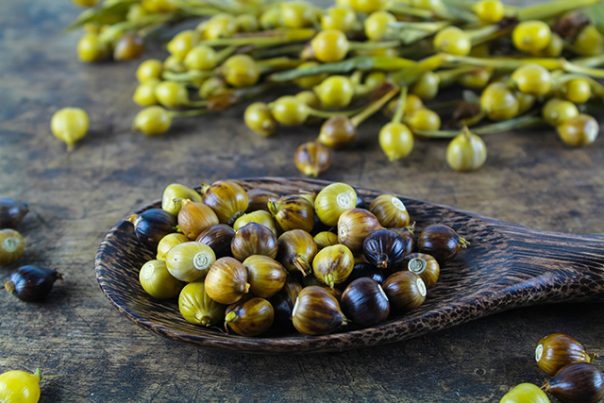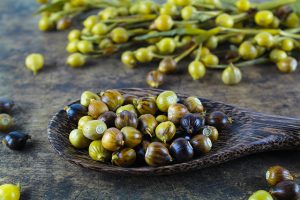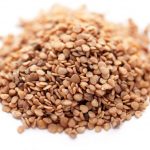
Coix – sources, health benefits, nutrients, uses and constituents at NaturalPedia.com
Tuesday, August 29, 2017 by Jhoanna Robinson
http://www.naturalnewsherbs.com/2017-08-29-coix-sources-health-benefits-nutrients-uses-and-constituents-at-naturalpedia-com.html

Coix, which are also called Job’s tears, yi yi ren, Chinese pearl barley, yi hato-mugi, adlay millet, coix lachrymal, coix lacryma-jobi, coix ma-yuen, lagrimas de job, soft-shelled Job’s tears, and samkru, are a kind of branched grass with broad leaves. It is endemic to Asia, in countries such as India, China, Sri Lanka, Malaysia, and Pakistan and thrives in a tropical climate.
Coix, which is an evergreen shrub, come in different colors such as white, brown, purple, and yellow and are tear-shaped, thus the moniker “Job’s tears”. It can grow up to two meters and its seeds have a mild flavor.
List of known nutrients
- Adenosine
- Amino Acids
- Arginine
- Benzoxasolinones
- Calcium
- Carotene
- Coixenolide
- Dietary Fiber
- Essential Fatty Acids
- Iron
- Isoleucine
- Leucine
- Lysine
- Methionine
- Phenylalanine
- Polysaccharides
- Protein
- Threonine
- Tryptophan
- Valine
- Vitamin B1 (Thiamine)
- Vitamin B2 (Riboflavin)
- Vitamin B3 (Niacin)
- Vitamin B5 (Pantothenic Acid)
- Vitamin B6 (Pyridoxine)
- Vitamin B7 (Biotin)
- Vitamin B8 (Inositol)
- Vitamin B9 (Folate)
- Vitamin B10 (Para Amino Benzoic Acid)
- Vitamin B12 (Cobalamin)
Medicinal uses for coix
Coix has anti-inflammatory and antiseptic properties. It can address stiffness and pain in the joints and treat arthritis, gout, rheumatism, rheumatoid arthritis, edema (swelling of the legs, feet, or hands due to excessive fluid in the tissues), and mastitis (inflammation of the breast tissue, and carbuncle, which is characterized by a cluster of boils connected to each other under the skin).
Coix can be eaten to help regulate one’s cholesterol and blood sugar levels, therefore preventing the onset of diabetes.
Coix can be used to treat skin conditions like warts, blemishes, insect bites, and redness. It also moisturizes the skin in such a way that your skin becomes glowing and radiant.
Coix has sedative properties. It can induce sleep and control spasms.
Coix can treat beriberi, an illness that is caused by a deficiency in vitamin B1 or thiamine and is characterized by impairment of the heart and nerves.
Body systems supported by coix
Coix is good for the immune system. It can serve as a preventative food to counter the effects of hay fever and other conditions caused by allergies such as bronchitis, headaches, phlegm, pneumonia, and spleen issues. It also can be used as a treatment agaisnt cachexia, which is the general weakness and deterioration of the body due to chronic illness. It helps one recover fast from illnesses.
Coix is good for the excretory system. Ingesting it encourages the passage of water in the body and proper urine flow. It also treats gallstones, kidney stones, bloating as a result of water retention, urinary tract infection, dysuria (difficulty in urination), oliguria (the production of abnormally small amounts of urine), and ascetis (accumulation of excessive liquid in the peritoneal cavity due to liver disease).
Coix is good for the digestive system. It can address abdominal issues such as appendicitis, gastroenteritis, diarrhea, constipation, gastric catarrh or acute dyspepsia, dysentery (a kind of gastrointestinal disorder characterized by blood in the stool), and other intestinal diseases.
Coix is good for the respiratory system. It can address lung disorders such as bronchitis and haemoptysis (the coughing of blood from the respiratory tract below the level of the larynx, and lung cancer).
Coix is good for the male and female reproductive systems. It can be used to treat gonorrhea and address menstrual issues.
Coix is good for the ocular system.
Coix is good for the cardiovascular system.
Coix is good for the skeletal system. It can prevent the onset of osteoporosis. It can also prevent the occurrence of trismus or lockjaw.
Ways to use coix
Coix can be incorporated into rice, wild yam, and other herbs to come up with a tasty porridge treat.
Where to learn more
Summary
Coix is good for the excretory, digestive, respiratory, ocular, cardiovascular, skeletal, and the male and female reproductive systems.
Coix can be eaten to help regulate one’s cholesterol and blood sugar levels, therefore preventing the onset of diabetes.
Coix can be used to treat skin conditions like warts, blemishes, insect bites, and redness.
Sources include:
Tagged Under: Tags: coix






